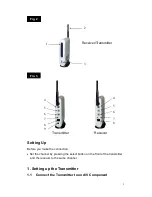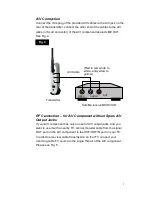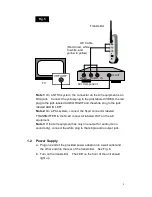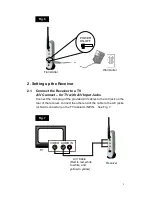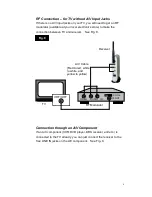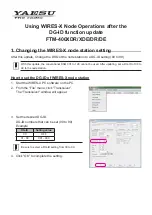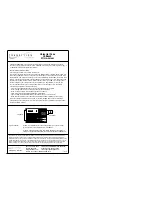
10
modulator (3 or 4).
If the signal is poor, or there is interference
•
Adjust the transmitter by rotating orientations until you get the best reception.
•
Change the channel on both transmitter and receiver and make them the
same.
•
If there is a microwave oven in use in the path between the transmitter and
receiver, remove the microwave oven or turn it off.
•
Make sure the transmitter and receiver are within range of each other (range
of approximately 300 feet; 100 meters in a clear line of sight).
Care and Maintenance
•
Keep all its parts and accessories out of the reach of young children.
•
Do not attempt to open the case. Non-expert handling of the device may
damage it.
•
Keep dry. Precipitation, humidity, and liquids, contain minerals that will
corrode electronic circuits.
•
Do not use or store in dusty, dirty areas. Moving parts may be damaged.
•
Do not store in hot areas. High temperatures can shorten the life of
electronic devices and warp or melt certain plastics.
•
Do not store in very cold areas. When the A/V sender warms up (to its
normal temperature), moisture can form inside the case, which may damage
electronic circuit boards.
•
Do not drop, knock, or shake it. Rough handling can break internal circuit
boards.
•
Do not use harsh chemicals, cleaning solvents, or strong detergents when
cleaning.
•
Operate this product using only the power supply included with it.
•
Do not overload electrical outlets or extension cords as this can result in fire
or electric shock.
FCC Label Compliance Statement:
This device complies with Part 15 of the FCC Rules. Operation is subject to the
following two conditions: (1) this device may not cause harmful interference,
and (2) this device must accept any interference received, including
interference that may cause undesired operation.
Note:
The manufacturer is not responsible for any radio or TV interference



